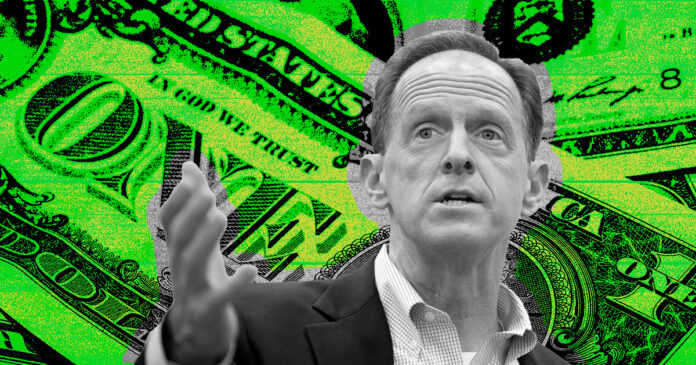
Soon-to-be retired U.S. senator Pat Toomey introduced a bill on Dec. 21 that could pave the way for a more open stablecoin framework beginning next year.
Titled the Stablecoin TRUST Act, Toomey’s bill would allow several types of entities including depository institutions, state-based money-transmitting businesses, and national trust banks to act as stablecoin issuers. It would also extend that privilege to entities with “a new federal license designed specifically for payment stablecoin issuers.”
The bill would also establish public disclosure requirements for entities that issue stablecoins. These issuers would be required to disclose their redemption policies, indicate which assets are used as collateral and publish attestations from accounting firms.
Issuers would also need to back their stablecoins with “high-quality liquid assets,” according to a summary of the bill published alongside today’s announcement.
A discussion draft of the Stablecoin TRUST Act was previously introduced in April and the full bill was introduced on Dec. 21.
Toomey said that this model aims to encourage competition by ensuring that companies other than insured depository institutions can issue stablecoins. He also stated that the bill will stop the U.S. Federal Reserve — noted for its cautionary stance toward stablecoins — from blocking developments around future legislation.
Toomey is expected to retire in the coming weeks. In light of that fact, Toomey clarified that the bill is intended to help other legislators pass legislation in 2023. He said:
Stablecoins are an exciting technological development that could transform money and payments…I hope this framework lays the groundwork for my colleagues to pass legislation next year safeguarding customer funds without inhibiting innovation.
Proposals issued by other U.S. lawmakers this summer have put forward stricter rules that would treat stablecoin issuers much like banks. Such proposals could restrict non-financial companies from issuing stablecoins, potentially limiting the ability of top stablecoin firms like Tether and Circle to operate within the U.S.
However, Toomey is known for his efforts to liberalize crypto legislation, and as such the Stablecoin TRUST Act’s broad allowances are expected.
Toomey has been involved in other efforts to create more open crypto legislation in recent years. This summer, he undertook an effort to grant tax exemptions to small crypto holders. In 2021, he opposed a controversial infrastructure bill that would have expanded rules for crypto brokers to several other types of companies.
Toomey also put forward a bill on Dec. 21 that seeks to reduce the number of Federal Reserve banks over concerns about their left-wing political alignment.
Credit: Source link






















 Bitcoin
Bitcoin  Ethereum
Ethereum  XRP
XRP  Tether
Tether  Solana
Solana  USDC
USDC  Dogecoin
Dogecoin  Cardano
Cardano  Lido Staked Ether
Lido Staked Ether  TRON
TRON  Wrapped Bitcoin
Wrapped Bitcoin  Wrapped stETH
Wrapped stETH  Chainlink
Chainlink  Avalanche
Avalanche  Sui
Sui  Stellar
Stellar  Litecoin
Litecoin  Shiba Inu
Shiba Inu  Toncoin
Toncoin  Hedera
Hedera  LEO Token
LEO Token  Hyperliquid
Hyperliquid  USDS
USDS  Polkadot
Polkadot  WETH
WETH  MANTRA
MANTRA  Bitcoin Cash
Bitcoin Cash  Bitget Token
Bitget Token  Ethena USDe
Ethena USDe  Wrapped eETH
Wrapped eETH  Uniswap
Uniswap  Monero
Monero  NEAR Protocol
NEAR Protocol  Pepe
Pepe  WhiteBIT Coin
WhiteBIT Coin  Aave
Aave  Ondo
Ondo  Bittensor
Bittensor  Aptos
Aptos  Internet Computer
Internet Computer  Dai
Dai  Official Trump
Official Trump  Ethereum Classic
Ethereum Classic  Tokenize Xchange
Tokenize Xchange  Mantle
Mantle  OKB
OKB  Gate
Gate  sUSDS
sUSDS  Coinbase Wrapped BTC
Coinbase Wrapped BTC 
